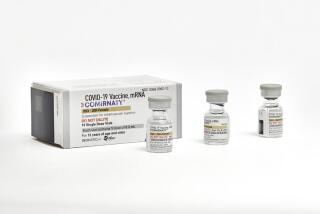Accuracy of Critical Report Questioned : Researcher Defends Results of Nation’s War on Cancer
- Share via
LA JOLLA — The nation’s war on cancer is not an unqualified success, admits the director of the prevention and control division at the National Cancer Institute in Washington.
But Dr. Peter Greenwald argued in an interview here Friday that neither is the war lost, as was claimed in a controversial study published last month.
The study, compiled at the Harvard University School of Public Health and published last month in the prestigious New England Journal of Medicine, examined the national mortality rate for all cancers between 1962 and 1982. It found that the number of people who died from cancer rose from 170.2 to 185.1 per 100,000 population.
As a result, the article, written by Harvard statistician John Bailar, labeled the nation’s post-war effort to treat cancer largely a failure and called for more emphasis on prevention programs.
Greenwald was critical Friday of the Bailar article for keying on a single statistic, which he said does not accurately sum up progress against cancer from numerous programs in research, prevention, screening and treatment.
Taken together, the results from the varied studies under way not only in the United States but elsewhere add up to a far more positive picture of the cancer battle than painted by critics, he said.
Greenwald was in San Diego to speak at the annual meeting of the Assn. of American Cancer Institutes being held at the La Jolla Cancer Research Foundation. The group is an umbrella organization of some 70 hospitals and institutes funded by the National Cancer Institute.
“There’s been much progress in basic cancer research, leading both to advances in prevention and treatment,” Greenwald said. “We’ve not ignored prevention; in fact, 30% of the NCI budget ($1.3 billion) goes for cause and prevention.”
Greenwald pointed out that basic research in the past conclusively showed that tobacco causes numerous cancers. In fact, if all Americans stopped using tobacco tomorrow, the number of cancers in the U.S. would be cut by 30%, he said.
In other words, Greenwald said, prevention and treatment programs are not mutually exclusive but go together.
“We’d like to see more of the knowledge we have developed used by people to stop smoking and to change their diet, to eat less fat and more fiber, because we know that lung and colon cancer (among others) can be affected,” Greenwald said. “It’s not a deficiency of cancer research but a question of society taking the necessary steps to cut down cancers.
“Bailar would do better to look at some of the barriers that exist to using more of the research knowledge.”
In addition, Greenwald said that cancer detection programs have proven effective in spotting cancers of the cervix, breast and colon earlier than previously, and allowing treatment to begin earlier, thus prolonging and saving lives. He estimates that early detection, especially of breast cancer, could prevent as many as 30,000 of the 38,000 annual deaths that now occur among women over 50 years old.
The last five years in particular have seen what Greenwald called “an explosion” in basic research that will only much later affect mortality rates as the information becomes part of clinical treatments.
And ongoing clinical trials have had positive effects on both curing and improving the lives of cancer patients who take part in them, Greenwald said. He added that no statistic can measure the improvement in quality of life of an elderly patient or the chance for a child to live to be an adult.
“If we are going to ask what is the best measure of progress, I’d say that everything combined--treatment and prevention measures included--indicates cautious success and not failure.”
More to Read
Sign up for Essential California
The most important California stories and recommendations in your inbox every morning.
You may occasionally receive promotional content from the Los Angeles Times.













